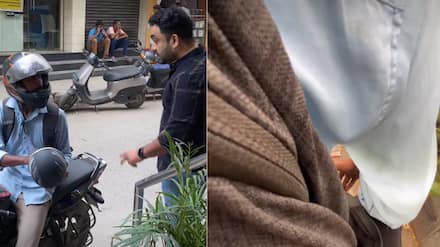The Wilson Garden police on Friday arrested a bike taxi rider for allegedly molesting a woman during a ride in Bengaluru, bringing yet another unsettling reminder of persistent safety concerns faced by women in urban transport systems. The incident has triggered strong public reactions, with many demanding tighter regulatory frameworks for ride services. The swift police action has been praised, yet citizens continue to question the adequacy of preventive measures. As the investigation unfolds, the case has once again drawn attention to systemic vulnerabilities in app-based ride platforms and the urgent need to strengthen safeguards for commuters.
Police reports indicate that the woman had booked a two-wheeler taxi through an app-based aggregator. The rider allegedly diverted from the designated route, initiated inappropriate physical contact, and subjected the woman to molestation. Shocked by the sudden turn of events, the woman raised an alarm and subsequently approached the police, who registered a case and initiated immediate action. The accused rider, reportedly in his mid-20s, was apprehended on Friday and taken into custody for interrogation. Authorities stated that the rider did not have previous criminal records, but the investigation would probe deeper into his past.
The police have registered a case under relevant provisions of the Indian Penal Code pertaining to molestation and outraging the modesty of a woman. Officials confirmed that the survivor’s medical examination has been completed, and her statement has been recorded before the investigating officer. The incident, though isolated, highlights a recurring pattern of vulnerabilities in public mobility systems. Policymakers and civil society organisations are increasingly advocating for stricter ride-service regulations, including enhanced background checks, route-tracking mechanisms, and immediate SOS response units.
INCREASING URBAN TRANSIT ANXIETY
Public debates around women’s safety in shared and app-based transport have intensified over the past decade. Experts say the rapid expansion of ride-hailing services has outpaced the evolution of safety infrastructure. Women often choose bike taxis for affordability and speed, but these benefits sometimes come with compromised security. Urban planners emphasise that transportation policies must integrate gender-sensitive approaches, prioritising harassment prevention, safe pickup points, driver verification, and stronger surveillance systems. The present incident has reignited demands for broader reforms to ensure safer mobility experiences.
Transport activists point to gaps in the verification processes for drivers. While aggregators claim to conduct background checks, the absence of transparent systems raises doubts about their thoroughness. Many bike taxi riders operate on minimal documentation, lacking in-depth scrutiny. Additionally, the two-wheeler format makes it harder for riders to install and monitor cameras, further weakening security. Women travelling alone, especially during late hours, face heightened risks. Though the current case occurred in daytime, experts argue that preventive frameworks should remain uniform across time zones and geographical boundaries.

Civil society organisations have urged the Karnataka Transport Department to push for mandatory GPS trip enforcement, regular behaviour-training sessions for drivers, and stringent penalties for violations. They emphasise that safe urban mobility is not merely an operational requirement but a core necessity for equitable access. The call to strengthen legal consequences for perpetrators also gains relevance, particularly when behavioural crimes often rely on survivor testimony. Streamlined reporting systems could empower survivors to come forward without fear of stigma or systemic inadequacy.
CALL FOR POLICY STRENGTHENING
The Wilson Garden case has also reignited broader conversations about the need for public awareness and proactive policing. Citizens argue that ensuring women’s safety must remain a shared responsibility involving law enforcement, private platforms, and community networks. The Bengaluru Police have intensified patrolling and promised to increase vigilance in busy commercial hubs as well as residential clusters. Officials also emphasise the usefulness of existing mobile safety applications, urging citizens to make full use of them when in distress.
Legal experts note that the accused rider, if convicted under relevant IPC sections, could face imprisonment in addition to fines. However, they stress that criminal procedures must remain survivor-centric, prioritising privacy, mental health support, and timely trial processing. Gender-rights advocates further argue that many survivors avoid reporting such incidents due to fear of backlash or disbelief. Ensuring a supportive environment at police stations, coupled with survivor-friendly investigation practices, could help bridge this gap.
This case, while centred on one incident, is reflective of a larger national challenge. According to gender-safety advocates, mobility for women is deeply intertwined with professional independence, educational access, and overall quality of life. Episodes like this create psychological barriers, forcing many to modify routines, avoid late-evening travel, or completely opt out of certain transit modes. Such behavioural shifts impact economic participation and reinforce gendered inequalities. Thus, the need for comprehensive safety reforms remains not only a legal obligation but also a sociocultural priority.
In response to the incident, several citizens took to public forums to express shock and demand swift justice. Many emphasised that policing alone cannot solve the issue and that ride-service platforms must assume greater responsibility. They propose enhanced panic-button integration, real-time monitoring dashboards, and clear helpline visibility within the application interface. In cities like Bengaluru, where reliance on two-wheelers remains high due to traffic constraints, collaborative strategies between companies and authorities could transform commuter experiences.
The Bengaluru Police have assured that the case will be prosecuted with urgency. They encourage witnesses and those with relevant information to come forward. Authorities are also evaluating whether the aggregator followed due process before onboarding the accused. Any negligence could result in regulatory action. Meanwhile, the survivor is reportedly receiving necessary assistance, though privacy concerns limit disclosure. Police officials reiterated their commitment to ensuring that the city remains safe for all, urging the public to stay alert and utilise available emergency mechanisms.
As the incident continues to stir debate, policymakers and citizens alike recognise that isolated arrests must evolve into systemic reform. Improved surveillance, educational interventions around gender sensitivity, and legal streamlining could help rebuild trust. Advocates assert that urban safety planning must transcend infrastructure, integrating culture, behaviour, and accountability. Without such holistic frameworks, cities risk normalising unsafe environments. The Wilson Garden case stands not merely as an offence against an individual but as a reminder of the collective responsibility to safeguard societal well-being.
Conclusion
The arrest of a bike taxi rider in Bengaluru for allegedly molesting a woman has sparked fresh debate on commuter safety, prompting urgent calls for action. While the swift police response is commendable, the episode underscores persistent systemic weaknesses in regulating app-based mobility platforms. As Bengaluru advances as a technology-driven metropolis, the governance of public transportation must evolve alongside it. The incident reinforces that women’s safety is not solely a policing issue but a broader socio-institutional responsibility. Sustainable solutions will require collaboration among law enforcement, service platforms, policymakers, and civil society to ensure safe, dignified, and equitable mobility for all.
Concerns have also arisen regarding the psychological aftermath experienced by survivors of transit-related harassment. Mental health professionals note that such incidents can create long-term anxiety, hypervigilance, and trust issues, especially when they occur during routine activities like commuting. Counsellors stress the need for accessible post-incident support, including guidance for survivors navigating legal processes. Women’s groups have urged state authorities to partner with mental health organisations to establish standardised support frameworks. They argue that emotional recovery must be recognised as an integral component of justice and rehabilitation. Without institutional focus on mental health, survivors often endure unseen consequences long after the case concludes.
The latest case also highlights the urgent role of community awareness in fostering safer environments. Experts insist that bystander intervention training could help individuals recognise unsafe situations and respond constructively. Many incidents escalate due to public hesitation or lack of awareness. Neighbourhood watch-style initiatives and citizen safety workshops have been proposed as active prevention mechanisms. Such models, already piloted in some metros, encourage residents to collaborate with law enforcement, report suspicious activity, and support vulnerable commuters. Advocates argue that proactive community engagement expands safety beyond institutional boundaries, transforming urban spaces into collective guardianships rather than isolated environments.
Women’s safety activists also point to the larger cultural context surrounding harassment. They argue that preventive action must begin with long-term education—instilling respect, consent, and empathy from an early age. Schools and colleges could implement gender-sensitivity and anti-harassment modules to help shift public consciousness. Campaigns promoting safe conduct in public spaces, supported by influencers and local leaders, could normalise conversations around harassment prevention. Such cultural investments, though gradual, create durable change. Many believe that without addressing societal mindsets, legal reforms and policing will remain reactive tools rather than holistic solutions capable of building a secure social fabric.
Meanwhile, there is growing demand for technological innovation to be leveraged more effectively for public safety. While ride-hailing apps already feature GPS tracking, digital safety shields, and emergency buttons, activists argue that these tools must be more intuitive and responsive. Suggestions include mandatory trip recordings, AI-based route deviation alerts, periodic driver evaluations, and instant escalation systems that notify authorities automatically. Technology researchers add that aggregated safety data could help identify high-risk zones, enabling strategic deployment of patrol resources. Improved digital transparency could also empower users to make informed decisions about their travel choices, particularly during late hours.

Amid ongoing debate, law enforcement agencies are reassessing their current standard operating procedures. Senior police officials have hinted at plans to expand special task units focused on transit-linked crimes, promising more dedicated manpower for rapid response. Discussions are underway to increase cooperation with ride platforms, potentially creating real-time data-sharing channels for emergencies. Police training modules may also be updated to prioritise victim sensitivity, ensuring respectful treatment throughout legal processes. While these proposals remain in developmental stages, authorities affirm their commitment to continuous improvement. The Wilson Garden incident, they say, serves as a critical opportunity to re-evaluate existing models and strengthen public safety mechanisms for the future.
Follow: Karnataka Government
Also read: Home | Channel 6 Network – Latest News, Breaking Updates: Politics, Business, Tech & More

